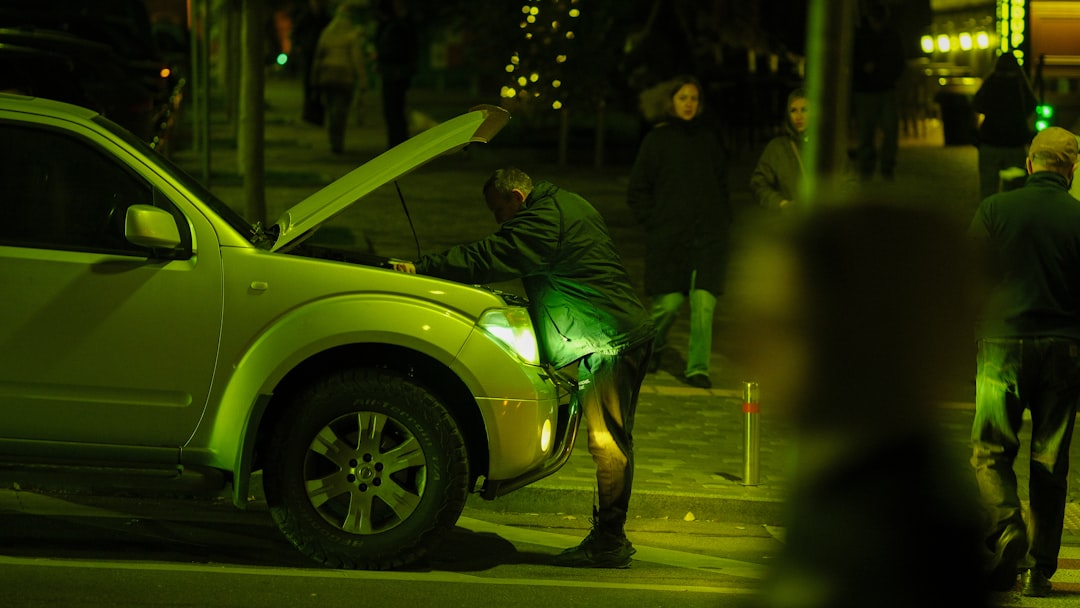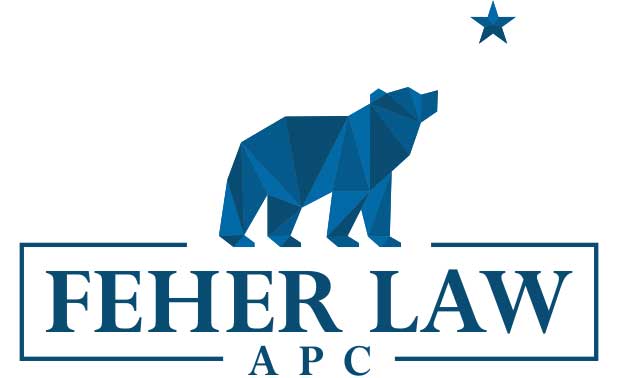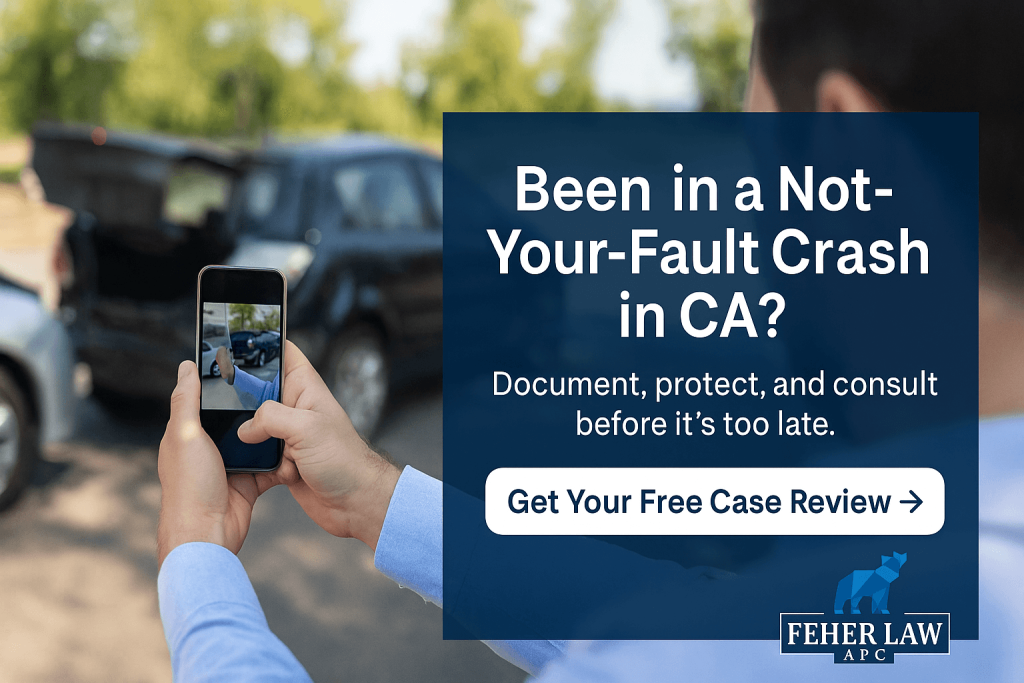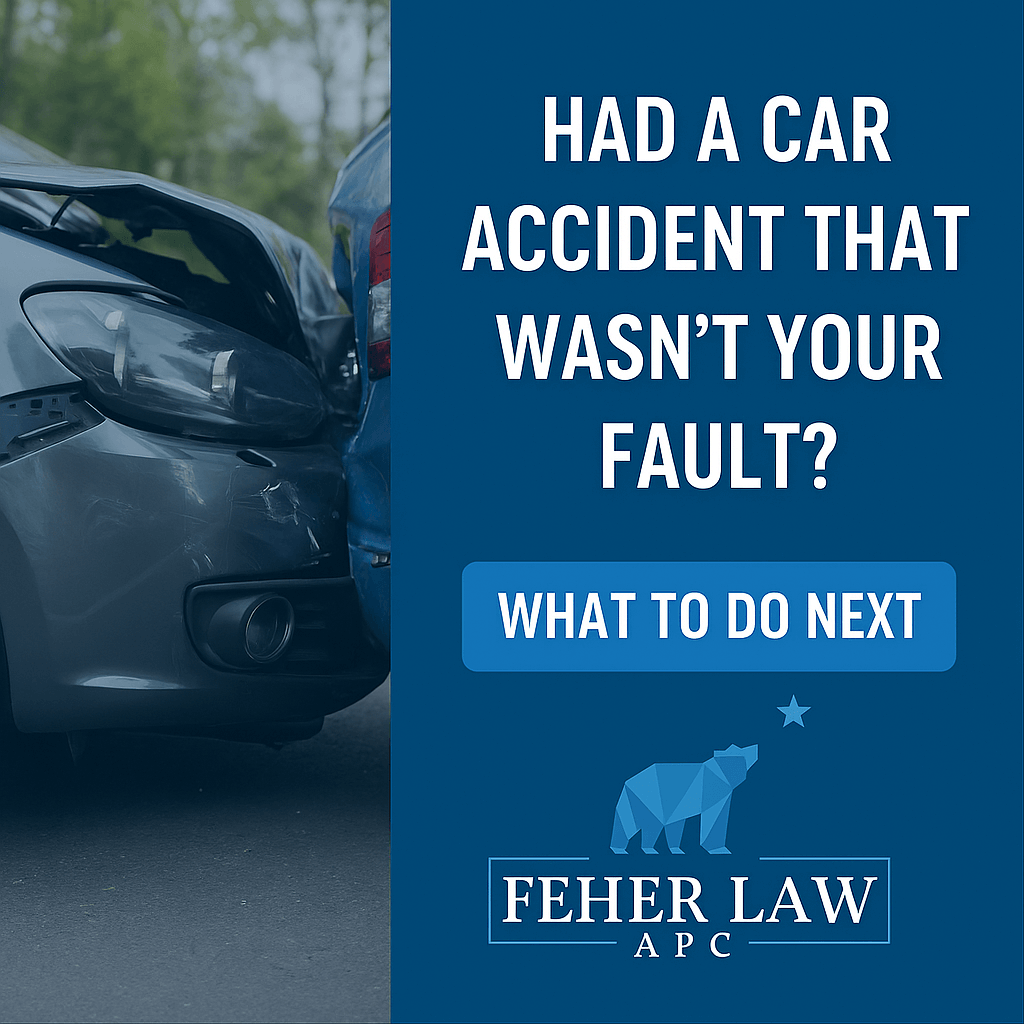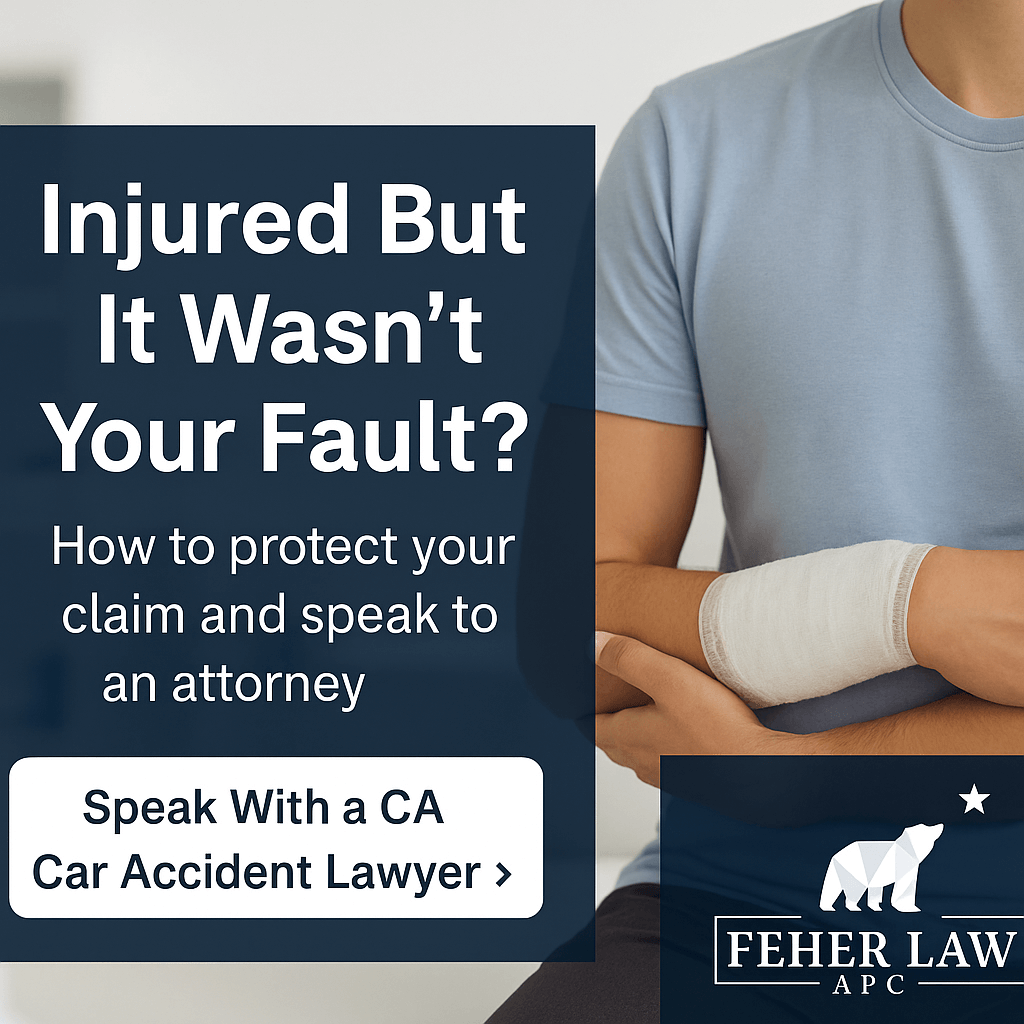What to Do After a Car Accident That’s Not Your Fault
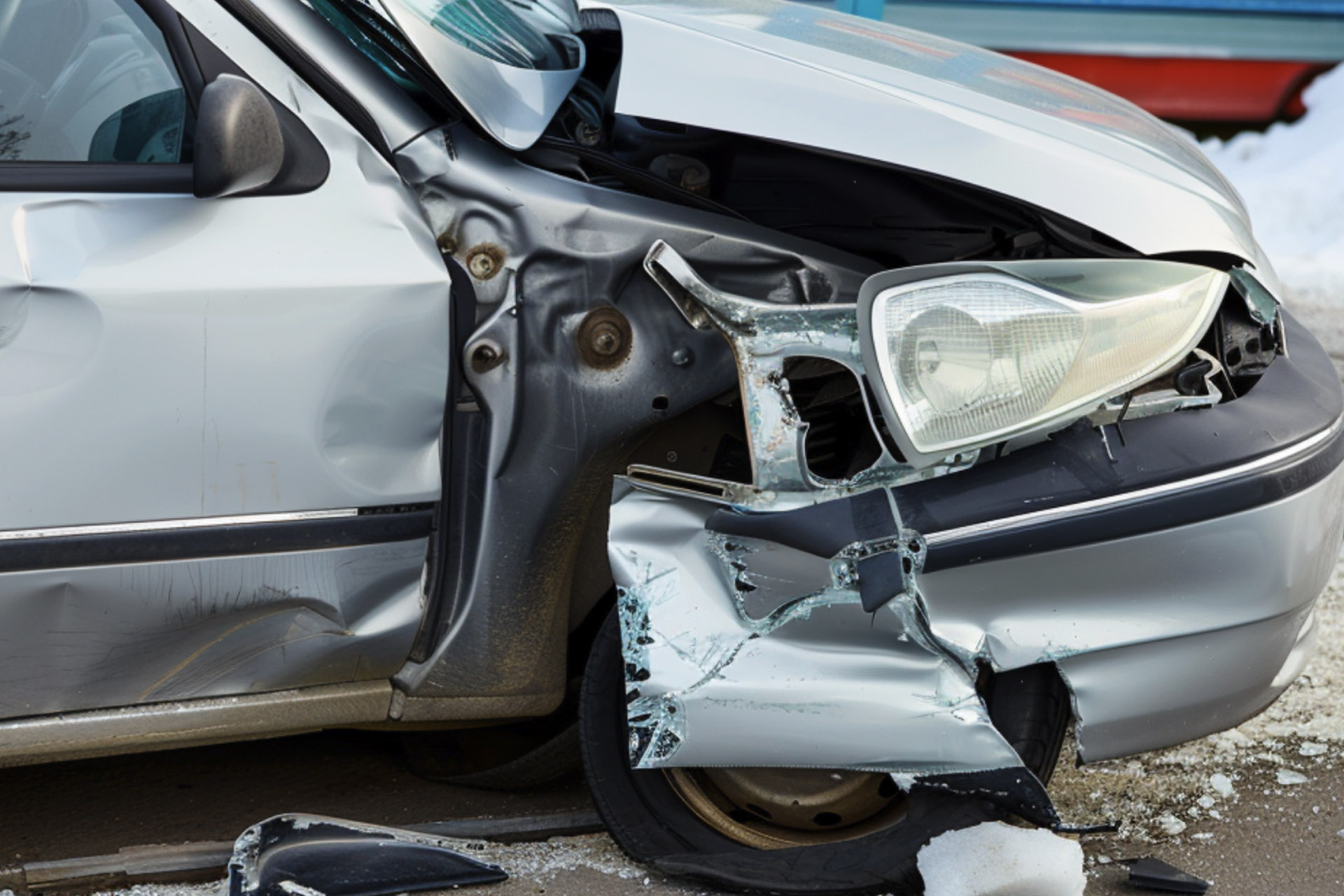
Your initial steps after a car accident in California that wasn’t your fault are:
- Ensure safety first
- Call the police
- Document everything
- Exchange information
Once the dust has settled, further actions you should take are:
- Seek medical attention
- Understand your rights
- Notify your insurance
- Get in touch with our lawyer
Car accidents are an unfortunate reality that can happen to anyone, anytime, regardless of how cautious a driver may be. Approximately 1.19 million people die each year as a result of road traffic accidents. Even the most vigilant individuals can find themselves involved in a collision due to the unpredictable nature of the road.
These statistics underscore this universal risk, revealing that accidents are common on our streets and highways. In the face of such uncertainties, it becomes important to know what to do after a car accident scene, particularly when it’s not your fault. If you were involved in the accident and you’re thinking to yourself, “I was in a car accident that wasn’t my fault,” then this guide will be helpful to you.
What to Do Immediately After a Non-Fault Accident
Immediately after an auto accident where you find yourself not at fault, it’s essential to remember that the accident wasn’t your fault, and swift, informed action can make a significant difference.
Knowing what steps to take in those key moments ensures your safety and lays the groundwork for the legal and insurance processes that may unfold.
1. Ensure Safety First
After your accident, start by checking yourself and any passengers for injuries. Even if injuries seem minor, getting medical attention promptly is essential. Once everyone’s condition is assessed, if the vehicles are still drivable and there are no serious injuries, move them to the side of the road. This helps prevent further accidents and eases the flow of traffic.
However, if moving the vehicles is not possible, make sure everyone moves to a safe location away from oncoming traffic. One important point to remember is that fleeing the scene of an accident is illegal, reasons, regardless of its severity.
Additional reading: should I get a lawyer for a minor car accident
2. Call the Police
A police report serves as an essential document in both legal proceedings and insurance claims, acting as an unbiased account of the incident, and helping insurance companies determine liability.
When the police arrive, cooperate fully by providing accurate information about the vehicle accident, including:
- Location
- Time
- Description of how the accident occurred
It’s important to be truthful and transparent, but at the same time, be cautious about admitting fault. While it’s essential to cooperate, avoid making statements that might suggest responsibility for the accident.
Additional reading: how long does a car accident settlement take
3. Document Everything
By meticulously documenting the incident, you lay the groundwork for effective communication with car insurance providers and legal representation, ensuring a thorough account of the events unfolds.
- Capture Comprehensive Photos: Capturing images from various angles is key to showcasing the extent of damages and creating a thorough visual record of the accident.
- Include Relevant Details: Extend your photo documentation to cover the overall scene, emphasizing road signs and traffic signals. It is essential to highlight any environmental factors that might have contributed to the accident, adding valuable context to the recorded evidence.
- Preserve Crucial Evidence: Ensuring clarity in your images is vital, focusing on both the immediate damages and the broader context of the accident to provide a comprehensive overview.
- Jot Down Immediate Recollections: Include any statements made by the other party or witnesses as well as your own is important, as these details can prove significant in the claims process and legal proceedings.
Additional Evidence to Collect
Beyond basic photos, gather these crucial pieces of evidence:
At the Scene:
- Weather conditions and visibility
- Traffic signal status and road signs
- Skid marks and debris patterns
- Vehicle positions before they’re moved
- Witness contact information and brief statements
Post-Accident Documentation:
- Police report number and responding officer details
- Medical documentation from emergency room visits
- Follow-up medical appointments and treatment records
- Work absence documentation for lost wages
- Repair estimates from multiple certified shops
California’s Department of the California Highway Patrol handles traffic collision reports, which you can request online for official documentation.
4. Exchange Information
Create a mental checklist of details to exchange: names, contact information, and addresses. Ensure you get the other driver’s insurance information, including the company name and policy number.
Don’t forget to note the make, model, and color of the vehicles, along with their license plate numbers. If there are passengers, gather their names and contact details as well. This information exchange is essential for filing insurance claims and facilitating communication with the other party’s insurance provider.
Stay calm and courteous during this process, focusing on gathering accurate details without engaging in unnecessary disputes. This shared information will play a pivotal role in determining responsibility and ensuring a thorough and fair resolution.
Additional reading: how much can someone sue for a car accident
For expert legal advice in California, contact a San Bernardino car accident lawyer for a free consultation
Further Steps to Take After the Accident
Being involved in a car accident can be overwhelming, especially when high emotions and circumstances are uncertain. Understanding the right steps to take is necessary to ensure your safety, protect your legal interests, and streamline the insurance process.
1. Seek Medical Attention
After a car accident, prioritizing your health is most important. This emphasizes the benefits of seeking medical attention, even without immediate symptoms.
Some injuries may not manifest immediately, and a medical evaluation can identify underlying issues. Make sure to always keep medical bills, too. By stressing the significance of this step, readers are reminded to prioritize their well-being, ensuring that potential injuries are addressed promptly for a smoother recovery process.
2. Understand Your Rights
Since California operates under a tort liability system rather than being a no-fault state, injured victims bear the responsibility to file car accident claims with the insurance company of the driver who is determined to be at fault.
This necessitates not only identifying the driver responsible for causing the car crash but also compiling evidence that substantiates their fault during the insurance claim process. It involves gathering pertinent documentation such as police reports, eyewitness statements, photographs of the scene, and any other proof that can support your case.
Victims should also be aware that California adheres to a comparative negligence rule. This means if you’re found partially at fault for the accident, your compensation might be reduced by your percentage of fault. For instance, if you’re deemed 20% responsible for an incident and have damages totaling $10,000; you would potentially receive $8,000 after subtracting your share of blame.
California’s Minimum Insurance Requirements
California law mandates specific minimum coverage amounts that all drivers must carry:
| Coverage Type | Minimum Amount | What It Covers |
|---|---|---|
| Bodily Injury (Per Person) | $15,000 | Medical expenses for one injured person |
| Bodily Injury (Per Accident) | $30,000 | Medical expenses for all injured parties |
| Property Damage | $5,000 | Vehicle repairs and property damage |
Important Note: These minimums are often insufficient for serious accidents. The California Department of Motor Vehicles strongly recommends purchasing higher coverage limits and uninsured/underinsured motorist protection.
🚗 California has one of the highest rates of uninsured drivers in the nation, with approximately 16.6% of drivers lacking proper insurance coverage according to the Insurance Research Council.
How California Protects Not-at-Fault Drivers
⚖️ Proposition 103 Protection: California’s Proposition 103, enacted in 1988, provides crucial protection for drivers involved in accidents they didn’t cause. This law prohibits insurance companies from increasing your premiums based solely on accidents where you were not at fault.
Key Benefits:
- Premium Protection: Your rates cannot increase if you’re 0% at fault
- Rate Approval Process: Insurance companies must get state approval before raising rates
- Consumer Advocacy: The Insurance Commissioner oversees rate changes
This protection is overseen by the California Department of Insurance, which ensures compliance with consumer protection laws.
Hypothetical Scenario: Sarah was rear-ended while stopped at a red light in Los Angeles. Despite filing a claim and receiving compensation, her insurance premiums remained unchanged because Proposition 103 protected her from rate increases for this not-at-fault accident.
Given these complexities and potential pitfalls in proving fault and negotiating fair compensation, attorneys can help.
Additional reading: is it worth getting an attorney for a car accident
3. Notify Your Insurance
It’s imperative to inform your insurance company about the incident without delay. This step is vital for several reasons: it initiates the claims process, ensures that your insurer has all necessary information from the outset, and sets in motion any potential recovery or subrogation actions against the at-fault party’s insurer.
Promptly communicating with your insurance provider helps preserve your rights and may also assist in expediting any due compensation for damages or injuries sustained.
Moreover, this aids in documenting your account of events accurately and timely, which can be crucial if discrepancies arise later on.
Understanding Deductibles in Not-at-Fault Accidents
Whether you pay a deductible depends on how you file your claim:
Filing with At-Fault Driver’s Insurance (Third-Party Claim):
- No deductible required
- Slower claims process
- More negotiation required
- No impact on your premiums
Filing with Your Own Insurance (First-Party Claim):
- You pay your deductible upfront
- Faster claims processing
- Your insurer handles negotiations
- Potential deductible recovery through subrogation
Subrogation Process: Your insurance company will attempt to recover the money they paid (including your deductible) from the at-fault driver’s insurer. If successful, you’ll receive your deductible back.
Hypothetical Scenario: 🔧 Mike’s car sustained $8,000 in damage from a not-at-fault accident. He chose to file with his own insurance, paid his $1,000 deductible, and received $7,000 immediately. Six months later, his insurer successfully recovered the full amount through subrogation, and Mike received his $1,000 deductible back.
Additional reading: who is at fault in a rear end collision
4. Get in Touch With our Lawyer
Consulting with a lawyer following a car accident is crucial, especially in cases where fault is disputed, significant injuries are involved, or insurance offers fall short of covering all damages. A lawyer’s expertise helps protect your rights and navigate the complexities of your claim to secure fair compensation.
Feher Law stands out as an excellent choice for representation due to our comprehensive understanding of personal injury law and proven track record in negotiating favorable settlements.
Our ability to clarify legal intricacies and commitment to advocating on behalf of our clients ensures that you’re not only informed but also well-supported throughout the claims process.
California’s Legal Deadlines
Time limits for filing claims in California are strict and unforgiving:
| Claim Type | Time Limit | Consequences of Missing Deadline |
|---|---|---|
| Personal Injury Lawsuit | 2 years from the accident date | Complete loss of right to sue |
| Property Damage Claim | 3 years from accident date | Cannot recover vehicle repair costs |
| Wrongful Death | 2 years from the date of death | Family loses right to compensation |
| Insurance Claim | Varies by policy | Check your policy terms immediately |
Important: These deadlines are set by California Code of Civil Procedure Section 335.1 and have very limited exceptions.
🗓️ Pro Tip: Don’t wait until the deadline approaches. Evidence disappears, witnesses forget details, and building a strong case takes time.
Additional reading: how long after a car accident can you sue in California
If you’re in the Los Angeles area, contact a Torrance car accident lawyer today for a free consultation and guidance on your next steps.
What Do You Do if a Minor Car Accident Is Not Your Fault
Minor accidents can be deceptive. Even “fender benders” require proper handling to protect your rights.
Defining a Minor Accident
Generally speaking, “minor” accidents are classed as such with the following features:
- Limited vehicle damage (under $1,000)
- No visible injuries to any party
- Vehicles remain drivable
- No airbag deployment
Special Considerations for Minor Accidents
Police Report Requirements:
- California requires police reports for accidents involving injury, death, or property damage over $1,000
- For minor damage, police may not respond, but you can file a report later at the station
- The California Highway Patrol allows online accident reporting for minor incidents
Documentation is Still Critical:
- Take photos even if damage seems minimal – hidden damage often appears later
- Exchange information completely – don’t skip steps because it’s “just a scratch”
- Get witness contact information if available
- Note the exact location and time
Hypothetical Scenario: Jennifer’s bumper was lightly tapped in a parking lot with only paint transfer visible. She exchanged information quickly and left. Two days later, her mechanic discovered $2,800 in underlying frame damage that wasn’t visible at the scene.
When to Still Call Police for Minor Accidents
- Dispute over fault exists
- Other driver appears intoxicated or impaired
- Other driver has no insurance or valid license
- Other driver wants to leave without exchanging information
- You feel unsafe or threatened
What to Do in a Car Accident With No Injuries
When everyone walks away unharmed, the process can be simplified but shouldn’t be rushed.
1. Immediate Safety Steps
- Move vehicles out of traffic if possible
- Turn on hazard lights to warn other drivers
- Check that everyone genuinely feels fine
- Be aware that adrenaline can mask injuries initially
2. Simplified Documentation Process
| Priority | Action | Time Required |
|---|---|---|
| High | Exchange insurance information | 5 minutes |
| High | Take photos of vehicles and scene | 5 minutes |
| Medium | Get police report number (if police respond) | 10 minutes |
| Medium | Note weather/road conditions | 2 minutes |
| Low | Gather witness information | 5-10 minutes |
3. California Reporting Requirements
Even with no injuries, you must still:
- Report to your insurance within the timeframe specified in your policy
- File a DMV report (Form SR-1) within 10 days if damage exceeds $1,000 to any vehicle
- Cooperate with investigations from both insurance companies
Important: The California Department of Motor Vehicles requires the SR-1 form even if no one was injured.
Hypothetical Scenario: ⚡ Two cars collided at low speed in San Diego with no injuries and minor damage. Both drivers felt fine and exchanged information quickly. However, one driver developed neck pain the next day, turning a “no injury” accident into a potential personal injury claim.
Guidance on a Car Accident Without Insurance But Not at Fault in California
Legal Reality: Driving without insurance in California is illegal and carries serious consequences, even if you’re not at fault for an accident.
Immediate Legal Consequences:
- License suspension for up to 4 years
- Vehicle impoundment for up to 30 days
- Fines ranging from $100 to $200 for first offense
- SR-22 filing requirement for future insurance
1. Your Recovery Options Despite No Insurance
From At-Fault Driver’s Insurance:
- You can still file a third-party claim against the at-fault driver
- Their liability insurance must still cover your damages
- No insurance requirement for filing against someone else’s policy
Limitations You’ll Face:
- No collision coverage for your vehicle repairs
- No rental car coverage while your car is being fixed
- No medical payments coverage for immediate medical bills
- Potential legal liability if the other driver or passengers are injured
2. Your Steps to Take:
- Document everything thoroughly – this is your only protection
- Seek medical attention and keep all records
- Get multiple repair estimates for your vehicle
- Contact the at-fault driver’s insurance immediately
- Consult our attorney immediately – you’ll need expert help navigating this situation
- Don’t admit you were driving without insurance at the scene
- Obtain insurance immediately before driving again
3. Financial Reality Check:
| Your Potential Costs | Estimated Range |
|---|---|
| License reinstatement fees | $125-$175 |
| SR-22 filing fees | $15-$50 annually |
| Increased insurance premiums | 30-50% higher for 3 years |
| Vehicle impound fees | $100-$300 |
| Court fines and fees | $100-$500 |
Hypothetical Scenario: Carlos was rear-ended while driving without insurance in Los Angeles. Despite being clearly not at fault, he faced license suspension and fines. However, he was still able to recover $15,000 from the at-fault driver’s insurance for his injuries and vehicle damage.
4. Getting Insurance After the Accident
Here are our top tips on getting insurance coverage:
- Purchase coverage immediately before driving again
- Expect higher premiums due to the lapse in coverage
- Consider SR-22 insurance if required by the court
- Shop around – some insurers specialize in high-risk drivers
Despite being armed with the above information, you should still be wary of insurance adjusters…
Critical Warnings About Insurance Adjusters
🚨 Recorded Statement Warning: California law does not require you to provide a recorded statement to the other driver’s insurance company. Insurance adjusters may pressure you, but you have the right to decline.
Common Adjuster Tactics to Avoid:
- Early Settlement Pressure: Offering quick, low settlements before you know the full extent of your injuries
- Minimizing Injuries: Suggesting your injuries aren’t serious or accident-related
- Fishing for Admissions: Asking leading questions to get you to accept partial blame
- Medical Records Requests: Asking for extensive medical history unrelated to the accident
What TO Do:
- Provide only basic accident facts
- Refer them to your attorney for detailed discussions
- Document all communications
- Never sign documents without legal review
What NOT to Do:
- Don’t give recorded statements without counsel
- Don’t accept the first settlement offer
- Don’t discuss pre-existing medical conditions
- Don’t admit any fault or speculate about causes
The California Courts Self-Help Center provides additional resources for understanding your rights during the claims process.
Additional reading: average car accident settlement in California
Why You Should Consider Consulting a Car Accident Lawyer
Using the services of a car accident lawyer can be a pivotal decision after a collision, offering several key advantages.
Car accident cases involve intricate laws and regulations, and having a lawyer by your side ensures that you understand your rights and can effectively navigate the legal intricacies.
- Navigating the Legal Complexities: A car accident lawyer ensures a clear understanding of your rights and responsibilities. Their expertise allows you to comprehend legal jargon, making informed decisions during the entire legal process.
- Expert Negotiation with Insurers: Lawyers possess expertise in advocating for fair compensation that adequately addresses your physical, emotional, and financial damages. Their experience in dealing with insurers ensures a strategic approach, increasing the likelihood of securing a favorable settlement.
- Ensuring Correct Paperwork: They will ensure that all necessary paperwork is filed correctly and within deadlines, preventing potential setbacks in the claims process. Their attention to detail reduces the risk of administrative errors, streamlining the overall legal procedures.
- Comprehensive Compensation: Car accident lawyers often secure compensation that fully accounts for physical injuries, emotional distress, and financial losses, surpassing initial offers from insurance companies.
- Guidance in Complex Cases: In disputes over fault, significant injuries, or unfair settlements, a lawyer’s expertise allows for a nuanced approach, addressing complexities and potential obstacles with clarity.
- Protection Against Unintentional Complications: Lawyers advise against admitting fault or providing detailed statements without legal counsel, protecting your rights, and preventing unintended challenges in the claims process. Their guidance helps you avoid common pitfalls during interactions with insurance companies and legal proceedings.
- Streamlining Legal Processes: Consulting a lawyer reduces stress and ensures you are well-supported during the aftermath of a car accident. They act as a reliable guide, simplifying complex legal procedures and allowing you to focus on your recovery.
- Increased Likelihood of Fair Resolution: With a lawyer’s involvement, there’s an increased likelihood of achieving a fair and just resolution, ensuring that you receive the compensation you rightfully deserve. Their advocacy aims to level the playing field, balancing the power dynamic in negotiations.
- Personalized Advocacy: You will get a tailored approach to the specifics of your case, and your unique needs and circumstances will be prioritized. This individualized attention ensures that your legal representation aligns with your specific situation, fostering a more effective and personalized legal strategy.
Additional reading: should i get a lawyer for a car accident that wasn’t my fault
What To Do After an Accident That is Your Fault
In California, accidents are governed by comparative fault laws, meaning that even if you are partially or entirely responsible for a car accident, you can still recover damages.
Under this system, fault is assigned as a percentage, and your compensation will be reduced by the amount of your fault. For example, if you are found 40% at fault for the accident, any damages you are entitled to will be reduced by 40%.
No matter what you think your element of fault might be, these are some general steps to take:
- Ensure Safety First: Move your vehicle out of traffic if possible and check if anyone needs medical assistance. Always prioritize safety at the scene.
- Stay at the Scene: Never leave the scene of the accident, as doing so could result in criminal charges.
- Call the Authorities: Contact the police to file an official accident report. While it’s important to cooperate, avoid admitting fault on the spot.
- Exchange Information: Collect and exchange contact and insurance information with the other drivers involved. If there are witnesses, gather their contact details as well.
- Document the Scene: Take photos of the vehicles, property damage, injuries, and the accident scene to provide evidence for your insurer and any potential legal proceedings.
- Report to Your Insurance: Notify your insurance company immediately. Be transparent about your role in the accident, as failing to do so could result in complications during the claims process.
- Understand the Implications of Fault: Admitting fault can raise your insurance premiums, and you could be held responsible for the other party’s damages. However, fault determination is a process handled by insurance investigators, police reports, and legal teams.
- Consider Legal Representation: Even if the accident was your fault, an attorney can help protect your rights, negotiate with the other party’s insurance, and limit your financial liability.
- Follow Up on Medical Care (If Injured): Seek medical attention if needed, and keep thorough records of all medical treatments, which may be important for your insurance claim.
Additional reading: what to do after a motorcycle accident in California
How to Get Over a Car Accident That Was Your Fault
Being involved in a car accident where you were at fault can be emotionally challenging. Feelings of guilt, anxiety, and stress are common, and it’s important to address these emotions to move forward. Here are some steps to help you cope and recover emotionally:
- Acknowledge Your Emotions: It’s normal to feel guilty, embarrassed, or even angry after an accident where you were at fault. Acknowledge these emotions instead of suppressing them. Feeling regret is natural, but remember that accidents happen, and no one is perfect.
- Talk to Someone: Sharing your feelings with friends, family, or even a therapist can help alleviate the emotional burden. Having a supportive person to talk to can give you perspective and help you work through the stress and guilt.
- Learn from the Experience: Accidents can serve as valuable learning experiences. Reflect on what led to the accident and consider how you can avoid similar situations in the future. Whether it’s practicing defensive driving or being more aware of road conditions, turning this event into a lesson can help you regain confidence on the road.
- Take Care of Your Mental Health: If you are struggling with anxiety or stress after the accident, it’s important to prioritize your mental health. Practice relaxation techniques like deep breathing or meditation, and maintain healthy habits like exercise and sleep. If needed, seek professional help to work through any trauma or emotional distress.
- Accept Responsibility, but Don’t Dwell: Accepting responsibility for the accident is part of the healing process, but don’t let it define you. Once you’ve handled the legal and insurance matters, try to focus on the future rather than constantly revisiting the past. Accept that mistakes happen and that you can move forward.
- Make Amends: If possible, reach out to the other party involved in the accident to apologize or offer help. Taking accountability and showing genuine remorse can provide closure and reduce feelings of guilt.
- Regain Confidence Behind the Wheel: After an accident, it’s normal to feel hesitant or nervous about driving again. Start with short, familiar trips to rebuild your confidence gradually. If you find yourself overly anxious, consider taking a defensive driving course to refresh your skills and feel more secure on the road.
- Be Kind to Yourself: Mistakes happen, and holding onto guilt won’t change the past. Practice self-compassion and remind yourself that accidents don’t define you as a person or as a driver. Focus on becoming a safer and more mindful driver in the future.
- Seek Professional Help if Needed: If you’re struggling to get over the accident and the emotional toll is affecting your daily life, don’t hesitate to seek counseling or therapy. A professional can help you process your emotions and work through any lingering trauma or anxiety.
Additional reading: Huntington Beach car accident lawyer
Ready to Take the Next Step?
Dealing with a car accident requires decisive actions for your well-being and claims. From immediate safety measures to dealing with insurance complexities, each step is essential. Remember to seek prompt medical attention and know your rights.
If you’re in need of expert help in California, contact Feher Law at (866) 646-6676 for expert guidance and a free consultation.
GET A FREE CONSULTATION
Our team is standing by and ready to assist you. Consultations are completely free and confidential. We will help you determine if you have a case.
- Over $100 Million Recovered For Clients
- No Fees Unless We Win
- We Fight for Maximum Compensation
- Get The Justice You Deserve
"*" indicates required fields
FAQs
Who pays for car accident damages?
Typically, the at-fault driver's insurance covers car accident damages. However, if the at-fault driver is uninsured or underinsured, your insurance policy may come into play, depending on your coverage.
Can I file a claim with the other driver's insurance directly?
Yes, you can file a claim with the other driver's insurance directly. This process involves providing them with details of how the accident happened, your damages, and supporting evidence. It's advisable to seek legal advice if complexities arise during this process.
What if the at-fault driver's insurance company denies my claim or offers an unfair settlement?
If the at-fault driver's insurance won't pay or offers an unfair settlement, consider consulting with a car accident lawyer. They can negotiate on your behalf and, if necessary, guide you through the process of filing a lawsuit to seek appropriate compensation.
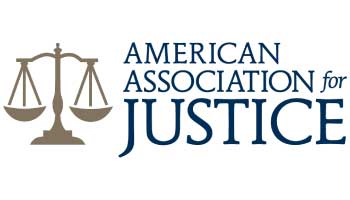
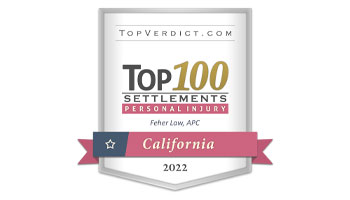

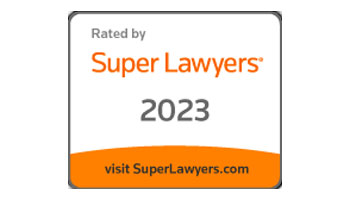
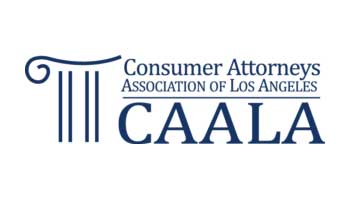

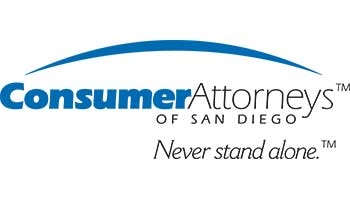
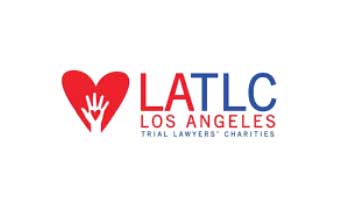
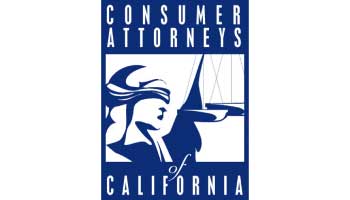
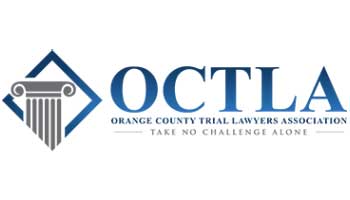
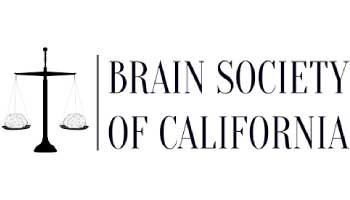
Related Posts
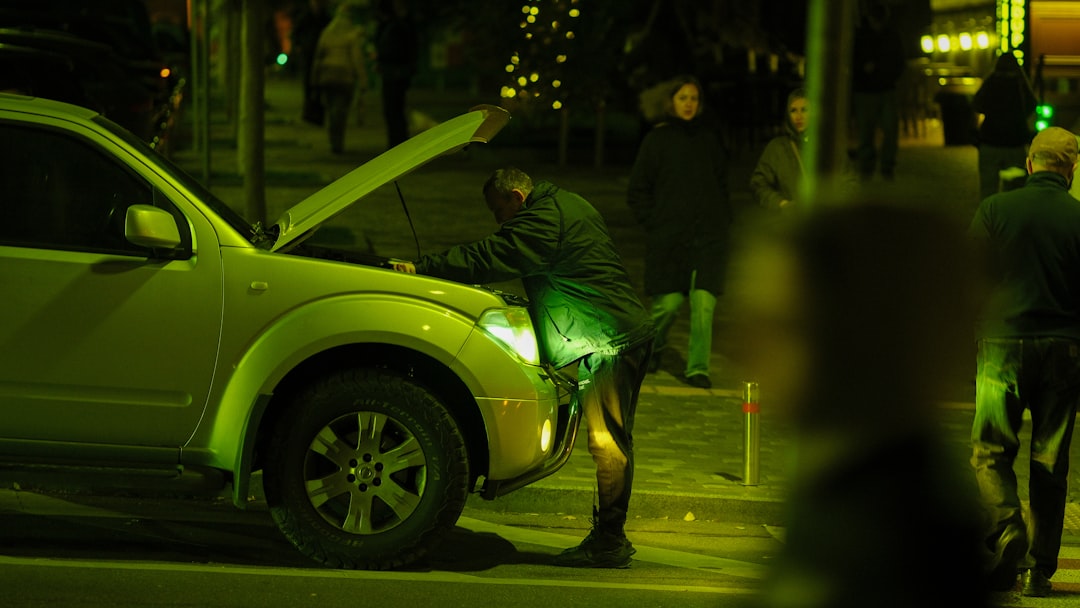
One Injured in LA Car Collision on SR 60
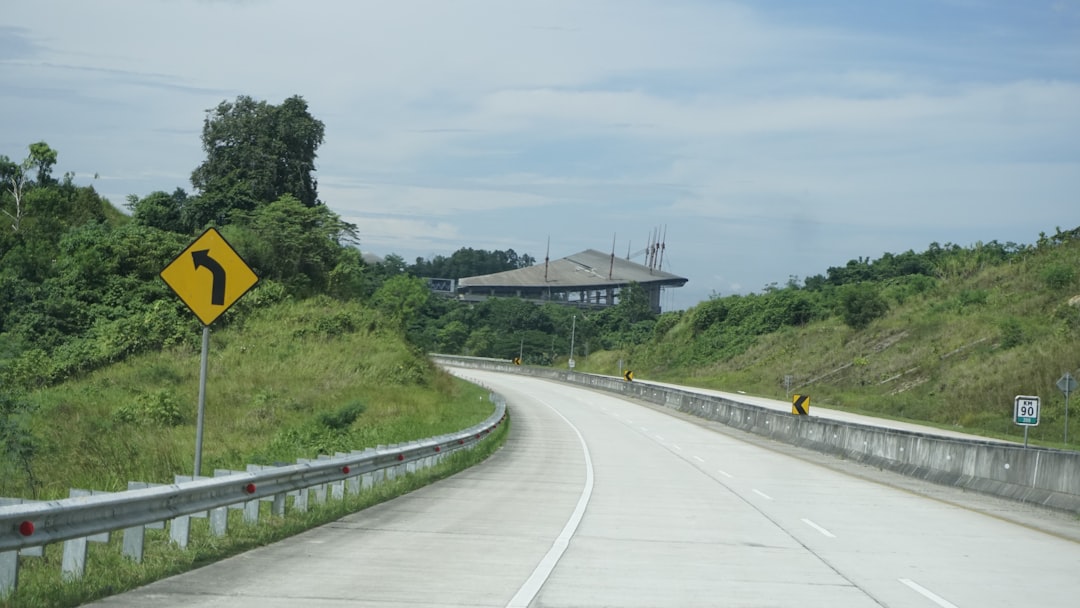
Fatal Crash on 14 Freeway Involving Big Rig

Getting Rear-Ended While Stopped in California
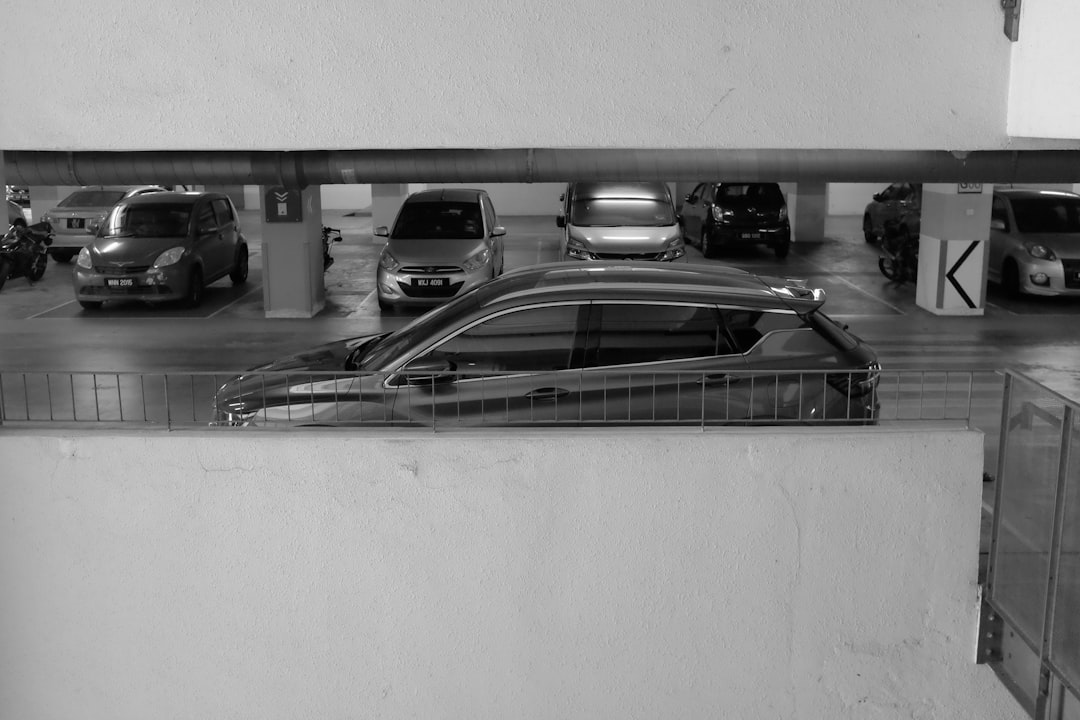
Woman Hit, Killed by Truck on SR 18 in Llano

Fired After Taking Approved Time Off in California?
